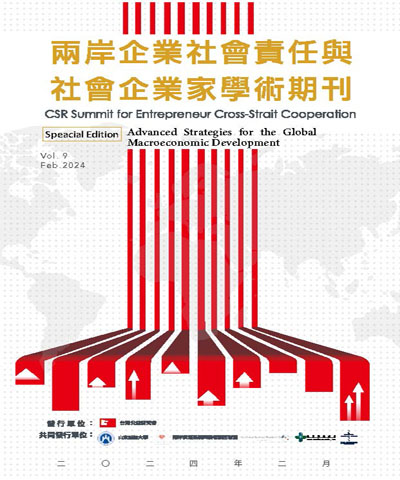
兩岸企業社會責任與社會企業家學術期刊/CSR Summit for Entrepreneur Cross-Strait Cooperation
社團法人台灣公益研究會,正常發行
選擇卷期
- 期刊
In order to reach the United Nations goal of no more than 1.5 degree centigrade temperature rise, 195 countries signed a commitment to reach Net Zero by 2050. As part of their efforts to reduce emissions of greenhouse gases, the UK signed into law its commitment to reach net zero, through the reduction of emissions and carbon offsetting. Carbon offsetting has been beset by criticisms, namely it is often used instead of making reductions in emissions, that its effects are not long lived and can be detrimental to landscapes and communities. However, when conducted ethically and sustainably, it has the potential to act as a complementary tool to reduction of emissions. Previous focus of carbon offsetting has been on larger organisations, but with smaller organisations making significant contributions to home economies, they are equally responsible for emissions, therefore also responsible to help achieve net zero. Currently there are factors which may impede smaller businesses for considering carbon offsetting as a tool, similarly, the existing schemes may provide challenges for those who may wish to reduce their carbon footprint. Therefore, this paper examines the factors which impede carbon offsetting use by SMEs and proposes a series of steps which may allow for greater usage of them as a device whilst overcoming some of the criticisms which have been levelled at them.
- 期刊
Culture as a field attracts vast research initiatives with longstanding historical tradition emphasising its meaning, but the research has proliferated in the last two decades into the economic side viewing the discipline from the business perspective. Archaeological cultural heritage represents Italy's touristic patrimony in well-known areas including Herculaneum, Pompeii, Paestum, Valle dei Templi, Colosseum and many others. However, there are many archaeological sites located in less known areas of South Italy labelled by the OECD as 'aree interne' (internal areas) in the regions of Puglia, Calabria and Basilicata where the archaeological cultural heritage could have an enormous economic potential if enhanced (OECD, 2020). These archaeological sites would economically benefit from cultural repositioning, namely by connecting culture to innovation in revitalization. This business case study showcases an example of such repositioning in terms of understanding the decision-making processes and factors behind innovative restoration on the archaeological site. The case proved to have an unprecedented return on investment and lead to the realisation of a sustainable model, which ultimately created and enhanced higher value for the community.
- 期刊
The article delves into normative debates within corporate governance, specifically exploring the dilemma of prioritizing shareholder interests versus considering a broader array of stakeholders. By emphasizing the significance of ethical frameworks in these discussions, the paper reveals how their improper application can result in flawed reasoning. It challenges the utilitarian argument supporting shareholder primacy and utilizes Kant's categorization of perfect and imperfect duties to counter deontological arguments favoring stakeholder theory of responsibility.
- 期刊
本研究旨在探討企業社會責任(Corporate Social Responsibility, CSR)對臺灣產業人才發展的影響。從文獻回顧的角度,我們發現CSR在人才招募、員工參與和留任,以及人才發展等方面發揮了重要的功能。首先,CSR作為人才招募的推動力,有助於企業建立道德和社會意識的形象,吸引價值導向的潛在應徵者。其次,CSR對員工參與和留任,可能提高工作滿足度和忠誠感。最後,透過CSR實踐,企業促進了員工的技能提升和個人成長,同時形成正面的組織文化。然而,一些企業可能僅將CSR視為提升商譽的手段,缺乏真正的承諾。本研究建議企業應該將CSR納入整體企業文化,確保其真實性和效果。同時,企業應該認識到人才發展的外部利益,實際上可能是社會公共資源和政府投資的共同成果。企業社會責任作為一項企業發展的重要議題,近年來伴隨著ESG這個新的觀念而扮演著愈發重要的角色。但在臺灣的經濟發展脈絡中,政府長期透過產業政策以引導經濟發展,不僅運用政府資源進行研發,而且也利用勞動力發展政策協助產業人才發展,許多企業往往認為產業人才是「公共財」,一般的職業訓練、人才培育是政府的責任,而較不願意以自己的資源投入於人才培育。因此,本文旨在分析CSR在臺灣產業人才發展中的影響,以探討企業如何整合CSR理念於人才發展策略中,並進一步瞭解CSR對不同產業的人才吸引、培訓和留任的影響。總結中,本文希望為企業在CSR實踐中的人才發展策略提供有意義的參考,同時豐富對CSR與產業發展之關聯性的瞭解。
- 期刊
2015年,聯合國啟動「2030永續發展目標」(Sustainable Development Goals, SDGs),該目標中的第十六項為「和平、正義以及強大機構」。本文希望愛爾蘭中立政策的策略與發展,可作為透過創建和平以促進永續發展的參考個案。本文旨在探討愛爾蘭中立政策的發展歷程,以及非傳統安全興起後,對愛爾蘭中立政策的衝擊與挑戰。本文的研究問題,主要有二。首先,本文希望探究愛爾蘭的中立政策的發展沿革,藉以瞭解愛爾蘭中立政策有何特色。其次,本文希望分析愛爾蘭中立政策,在非傳統安全的衝擊下,究竟有何重要轉變。愛爾蘭中立政策是否成為一種迷思,抑或其內涵有了新的發展與變遷?此外,本文將歸納非傳統安全衝擊下愛爾蘭中立政策的個案經驗,究竟有何重要啟發之處,並展望愛爾蘭中立政策的未來發展與方向。

